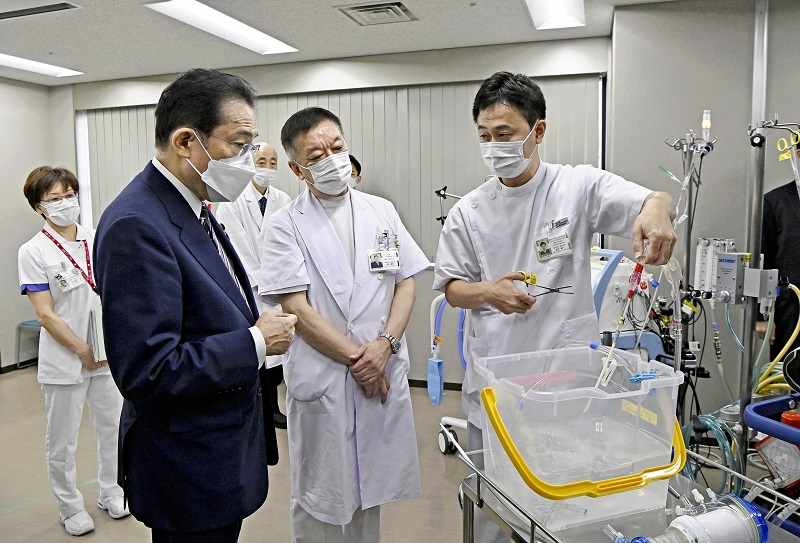Kishida’s Opening Moves / Coordination skills put to the test to combat COVID-19

Prime Minister Fumio Kishida listens to staff of Tokyo Metropolitan Bokutoh Hospital in Sumida Ward, Tokyo, on Saturday.
12:33 JST, October 9, 2021
Prime Minister Fumio Kishida launched his Cabinet on Oct. 4, the same day the percentage of the nation’s population vaccinated twice against the novel coronavirus exceeded the 60% mark. By November, the government expects to achieve its goal of administering two doses to everyone who wants them, which at an estimated 80% of the population, would provide Japan with the highest vaccination coverage of any country in the world.
The new prime minister faces the difficult task of easing pandemic restrictions while still warding off a sixth wave of infections heading into the winter.
One focus will likely be on how to make the most of expert knowledge. The existing government subcommittee on COVID-19 measures predominately consists of experts in infectious disease and healthcare.
“[The subcommittee] lacks the perspective to balance infection control and the economy,” a senior Finance Ministry official said.
Former Prime Minister Yoshihide Suga shared these misgivings over the subcommittee’s makeup, saying, “Its members are not balanced.”
After announcing his intent to step down as prime minister in September, Suga is said to have privately mulled restructuring or even disbanding the subcommittee, once it became clear that infections were ebbing.
Such a retooling of the subcommittee would not end up taking place during Suga’s tenure. However, when the decision was made on Sept. 28 to lift the state of emergency, the government named a handful of matters for future deliberation, including the potential use of vaccination certificates to allow venues to hold events at full capacity, even if another state of emergency were to be in effect.
The sources said such a list was not something the subcommittee was consulted on but rather reflected Suga’s intentions.
To the new administration, Suga has left the task of deepening discussions on whether economic activities should be carried out even if infections resurge, with the assumption that people will have to coexist “with the coronavirus.”
Kishida intends to launch his own expert panel, apart from the existing subcommittee, to examine social and economic activities amid the pandemic.
At a press conference after taking office on Oct. 4, Kishida explained that he hoped the new panel would generate “ideas and clues that will be necessary for us to think about the new normal.”
However, the administration could face difficulties reconciling potential conflicting views between the subcommittee and the envisaged panel.
On the economic front, the ruling parties need to reach a consensus over cash benefits for individuals, a main feature of stimulus measures for an economy worn out by the pandemic.
Kishida plans to make non-regular workers and other “vulnerable people who are struggling due to the pandemic” subject to the cash benefits, but has not yet mentioned the specific yen amount.
Meanwhile, Komeito, the Liberal Democratic Party’s junior coalition partner, has included in its pledge for the upcoming House of Representatives election a measure to provide benefits equivalent to ¥100,000 to children aged 0 to 18 across the board.
Kishida has been bitten by cash benefits before. In April last year, when he was chair of the LDP Policy Research Council during the administration of former Prime Minister Shinzo Abe, Kishida led the effort to provide ¥300,000 to households whose incomes had declined. However, having met with opposition mainly from Komeito, this plan was forced to be changed to a uniform ¥100,000, available to all.
There are arguments to be made both ways as to whether the ¥100,000 benefit had economic effects to match government spending. Some critics have even decried the benefits as pork-barrel spending.
The question of how to handle these issues will be an early test of the new prime minister.
Top Articles in Politics
-

Japan PM Takaichi’s Cabinet Resigns en Masse
-

Sanae Takaichi Elected Prime Minister of Japan; Keeps All Cabinet Appointees from Previous Term
-

Japan’s Govt to Submit Road Map for Growth Strategy in March, PM Takaichi to Announce in Upcoming Policy Speech
-

LDP Wins Historic Landslide Victory
-

LDP Wins Landslide Victory, Secures Single-party Majority; Ruling Coalition with JIP Poised to Secure Over 300 seats (UPDATE 1)
JN ACCESS RANKING
-

Japan PM Takaichi’s Cabinet Resigns en Masse
-

Japan Institute to Use Domestic Commercial Optical Lattice Clock to Set Japan Standard Time
-

Israeli Ambassador to Japan Speaks about Japan’s Role in the Reconstruction of Gaza
-

Man Infected with Measles Reportedly Dined at Restaurant in Tokyo Station
-

Videos Plagiarized, Reposted with False Subtitles Claiming ‘Ryukyu Belongs to China’; Anti-China False Information Also Posted in Japan






















